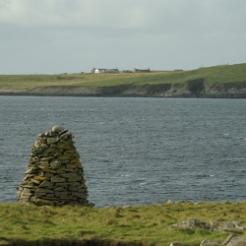The Office of the Scottish Charity Regulator (OSCR) has approved the plans laid out by one of Scotland's largest charities to reorganise its board, despite receiving 68 objections to the proposals.
In 2009 the Shetland Charitable Trust was ordered by OSCR to restructure its board in order to reduce its links to the Shetland Council. Some 22 out of the charity's 24 trustees are currently elected councillors and the regulator warned that this was detrimental to the charity's independence. This followed some concern about conflicts of interest between the two organisations.
The new structure will reduce the number of trustees to 15, comprising eight appointed non-councillor trustees and seven councillor trustees. A quorum of six trustees, three of which must be appointed trustees, will be required to pass decisions.
But 68 local objections to the plans were lodged in a long-running debate about the necessity for the Trust to remain independent. Objectors believed that having elected trustees would maintain the community ownership of the Trust and its "democratic accountability".
Suggested amendments rebuffed
In a suggested amendment to the outlined plans objectors recommended that the appointed trustees be elected by the people of Shetland, rather than a selection panel as is to be the case. They also raised objections to the "lack of transparency" in regards to how the selection panel would be made up and similar concerns about a clause which would allow the Council, upon notice in writing, to appoint one or more councillor trustees to the board. It was not clear how these councillors would be chosen, objectors advised.
Further concerns were raised that former councillors who had not been re-elected would be allowed to enter the Trust "through a back door" under the new selection process.
OSCR, however advised that the decision it had to make "was either to give or withhold its approval for the proposal put forward by the Trust" and not, therefore to enforce amendments.
Notifying the public of the regulator's approval of the plans, OSCR's head of charity services Martin Tyson said:
"We have carefully examined the proposal made by the Shetland Charitable Trust as well as the various objections we received. As regulator our only consideration must be whether the proposal, if implemented, would enable the charity to be administered more effectively. Having considered the proposal and all the relevant issuses, our view is that this requirement is met.
"It is now for the trustees to put into practice the scheme that they have proposed. We would look to see them do so as quickly as possible."
There is, however, no appointed timescale for the changes to be implemented. The charity will have three months after implementation in which to notify OSCR of the changes.
Conflicts of interest
The Shetland Charitable Trust has an annual income of £10.7m and assets in excess of £200m, making it one of Scotland's largest charities. Predominantly a grantmaking charity, the Trust is a major funder of charitable and community projects in Shetland, but in May 2010 Audit Scotland was brought in following concerns that the charity was being used to subsidise council income. Audit Scotland has raised concerns over the years about the treatment of the Council's dealings with the Trust being omitted from the Council's accounts for the past six years, leading to six qualified opinion reports being produced. OSCR stepped up in 2010 undertaking an investigation which threatened to freeze the charity's accounts and suspend trustees.
Conflicts of interest were identified which include the entering of service level agreements between the two parties, the leasing of property by the Trust to the Council, the provision of buildings by the Trust for the delivery of care in the rural community as part of a partnership agreement, and the sale of interest in Viking Energy Limited to the Trust.
Ann Black, chief executive of the Trust was forced by OSCR to put forward new governance proposals. Despite objection from members of the board the final plans were submitted in January this year, and approved on Tuesday (3 July).










